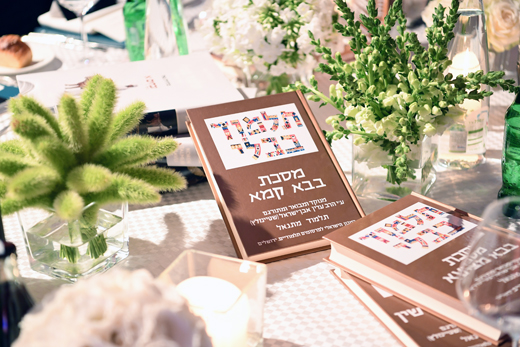
By Toby Klein Greenwald
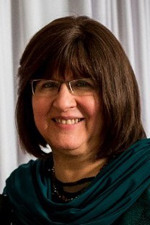
JERUSALEM — Once in a generation – if we’re lucky – do we witness the creation of a project so expansive, so extraordinary, that it revolutionizes Jewish scholarship for hundreds of thousands – perhaps millions — of people, and for future generations. Rabbi Adin Even-Israel Steinsaltz is perhaps best known for his trailblazing Babylonian Talmud, and as the Haggadah song, Dayenu, goes, “That would have been enough for us.” What is equally extraordinary is what was created concurrently with the Steinsaltz Talmud, what followed it, and what new projects are in the works, for he has produced commentaries also on Tanakh (Torah, Prophets, and Writings), the Mishna, the Mishneh Torah, and Tanya. All of these are now within the reach of both scholars and lay people, and going forward, they will become even more accessible through an ambitious online initiative, a digitization project that will provide global access to all Steinsaltz commentaries and translations.
On Sunday evening, June 10, the Steinsaltz Center hosted a Gala Dinner at the Orient Hotel in Jerusalem to mark the Rav’s 80th birthday and his pedagogical achievements. The entire evening – the display of his numerous books, the speakers, the eclectic collection of hundreds of guests from different countries, of various ages, and clearly from different landmarks in his journey – spoke to the theme of the evening that kept repeating itself: That the greatest achievement of Rav Adin Steinsaltz has been his ability to be a giant whose intellect could reach the stars, yet who could communicate and interpret the treasures of the Torah to those below who are as numerous as the sands of the earth.
I must add a disclosure. Yaakov, my husband (who has contributed to this article) and I both worked for Rav Steinsaltz; Yaakov also studied under him. The benefit of this close contact has given us a rare opportunity – to write about the man and his life’s work as observers who knew him when he was much younger, and even then, a visionary and dreamer. More on that later.
The dinner included a keynote speech by Rabbi Lord Jonathan Sacks and a tribute concert by Rabbi Avraham Fried, that morphed into a spontaneous “farbrengen” during the formal part of the concert, and continued again at the evening’s end, with guests and yeshiva students surrounding the Rav’s table in heartfelt song.
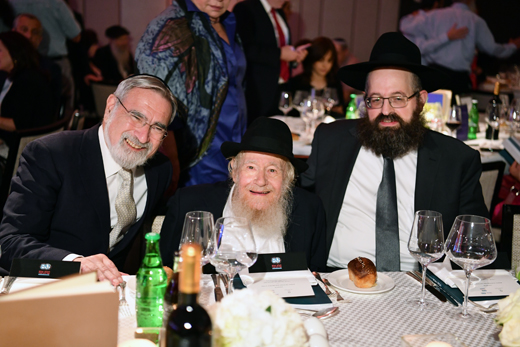
Rabbi Sacks said of the Rav, “He was trained as a scientist but has the soul of a poet. He was brought up by very secular parents. Adin told me that his parents insisted that he learn gemarra because they wanted him to be an apicorus (heretic), not an amaretz (ignoramous)…With his creative genius he has taken the most complex texts and turned them into the most simple messages.” He quoted the pasuk in Isaiah, “Vekol baneich limudi Hashem” – “And all your children shall learn of God” and noted how there have been attempts in the world to create egalitarianism in wealth and in power, and they have failed, but that Rav Steinsaltz has “dedicated his life to creating something egalitarian by opening the doors of study to everyone.”
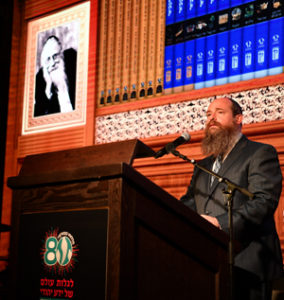
According to Rabbi Meni Even-Israel, Executive Director of the Steinsaltz Center, the Rav became Torah observant when he was 16. He studied chemistry and physics at the Hebrew University of Jerusalem. But he spent most of his time on Jewish studies and spent many hours with Rabbi Shmaryahu Sasonkin and the late Rabbi Shlomo Zavin. He also studied for a brief time at the Chabad Yeshiva in Lod, and began to publish essays, lecture and conduct educational activities for teens.
In 1965 the Rav married his wife Sara, opened a small hesder yeshiva (in which students divided their time between study and army service), and he founded the Israel Institute of Talmudic Publications in Jerusalem in cooperation with the Israeli Prime Minister’s Office, and the Ministry of Education and Culture. With that he began his life’s work: translating the Talmud from its original Aramaic into modern Hebrew, and adding a commentary that a layperson could understand. He was only 28 at the time. This is not as surprising as one might expect, because at 24 he had been appointed the youngest school principal in Israel, at a school in the Negev.
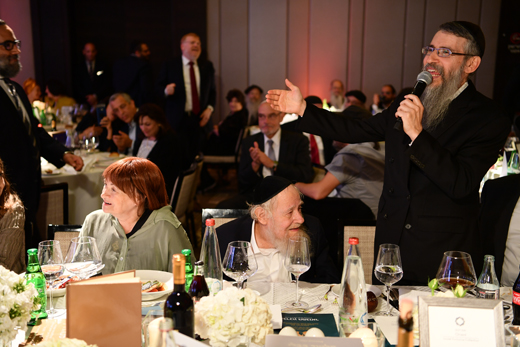
Though the small yeshiva could not sustain itself beyond the first year, it was a microcosm of things to come. My husband, Yaakov, who was one of the six students, recalls, “The highlight was the seudat shlishith (the third Sabbath meal) that we had at the home of the Rav every week. The singing, his inspirational stories, the atmosphere…this was what made the yeshiva special.” Since then the Rav went on to found a plethora of educational institutions, and that special atmosphere permeates them all.
The work of a lifetime
The Rav expected to complete his Talmud project within 13 years. It took 45. The first volume was published less than a year after opening the Center. It was followed by 40 additional volumes, and the project was completed in the month of Kislev of the Hebrew year 5771 (December, 2010). The English version is called The Essential Talmud. In 1991 he changed his last name to Even-Israel under the guidance of the Lubavitcher Rebbe, to whom he became very close. He was awarded the Israel prize in 1988 and many other prestigious prizes.
In the course of those 45 years the Rav published more than 60 books, numerous essays, recorded video classes and also taught and lectured throughout the world. Dr. David Rozenson, CEO and executive director of Beit AviChai, spoke passionately about the Rav’s work in Russia, where the Rav established a network of educational institutions for the Jewish community in the former USSR, including the first yeshiva formally acknowledged by the authorities (in 1989, prior to the fall of the Soviet Union), a Jewish university and a training school for preschool and elementary school teachers. In a video clip at the dinner he said the Rav was “magical” and “like Peter Pan.”
Rav Even-Israel also established other schools that are inspired by his worldview, such as an army yeshiva (Yeshivat Hesder) in Tekoa, Israel, and the Makor Chaim elementary, middle and high schools in and near Jerusalem: Sadly, the Makor Chaim high school yeshiva in Kfar Etzion became well known when two of the three teenaged boys who were kidnapped and murdered by terrorists, in 2014, were from that yeshiva. (One of them, Naftali Fraenkel, was my student.) But the yeshiva has morphed their tragedy into days of unity, in which they send students to secular schools in Israel to interact and create dialogue. During the years I taught in Makor Chaim, I discovered it was a high school yeshiva with out-of-the-box thinking and an atmosphere of curiosity, creativity and joy.
By 1976, the Rav had also created the Shefa Institute, consisting of an elite group of students who would study, write pedagogical materials, and teach in educational programs for adults, creating a new dialogue with Jewish texts. He hired me to help produce Shefa’s adult educational activities. I remember vividly meeting with the Rav in the Van Leer Jerusalem Institute, where he also had one of their rare private offices. It is written in Talmud Succa 21:2 “Even the prosaic conversations [sihat hulin] of wise men are equal to the entire Torah.” And indeed, even the Rav’s comments on prosaic matters were filled with rich philosophical insights and colorful anecdotes, and it was a privilege to just sit quietly and listen while he expounded on educational issues and Israeli society, as way of introduction to the next project.
Since 1965, the Rav has been laboring on his life’s work with the help of a select team, making the “treasure-troves of the Talmud” accessible to all, with unprecedented clarity. The Steinsaltz Hebrew Talmud received endorsements from several great rabbis in our times, including Rabbi Moshe Feinstein, Rabbi Ovadia Yosef, the Admor of Erlau, and many more.
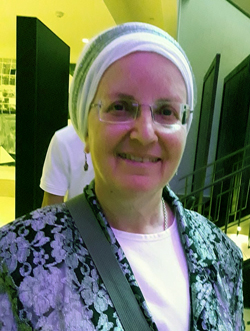
Yehudit Shabta, editor and translator, has worked for the Rav since 1989. She tells the following story, by way of illustrating the worldview of the Rav. “When our daughter was one-year-old we brought her to the Rav for a bracha. He said to the child, ‘I bless you that your parents will not get in the way of your growth.’”
Rav Yehoshua Schreier, the executive editor of the Koren Talmud Bavli in English, and a translator at the Steinsaltz Center, says, “The breadth of his knowledge and the breadth of the works he has produced is prolific. In virtually all of his works he introduces a perspective that wasn’t there before. It is truly remarkable.”
Anyone who teaches or studies or works in a Torah-related profession can find books by the Rav that will enrich his endeavors. We too have in our home many books by Rav Steinsaltz that have informed our teaching — on Talmud, Hassidut, Tanach, Jewish mysticism, and more. One of my favorites is a little book that I consult when authoring a new biblical musical – Biblical Images, Men & Women of the Book, which always enchants with refreshing and deep insights on biblical figures central to our national shared consciousness.
Tributes from around the world
The dinner reception featured a display of all 360 titles (including various editions and translations) produced by the Steinsaltz Center, an on-premises book sale by Koren Publishers, that today is the publisher of the Rav’s works, and a multimedia presentation detailing all of the educational institutions, programs and projects that will directly benefit from the CauseMatch campaign, that continues until mid-July. Those interested in contributing to campaign can donate via http://cmatch.me/LetMyPeopleKnow.
The evening included greetings from Member of Knesset Ze’ev Elkin, and video greetings from President Reuven Rivlin, Prime Minister Binyamin Netanyahu, who described some of the learning he had done with the Rav, and Minister of Education Naftali Bennet. There were award presentations to long-time Steinsaltz Center supporters Leo Noe, Israel Klabin, Tomas Gourney, Yitzchak Miralashvili, and the Matanel Foundation, via Joelle Aflalu.
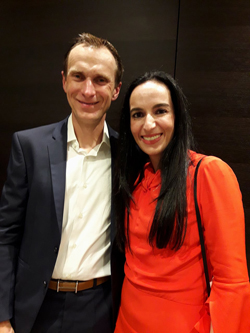
The wide geographical locations of the Rav’s supporters was represented at the dinner. Tomas Gourney came to America 30 years ago from Poland. He wife, Aviva, came with her family from Iran before the revolution of 1979. They live in Scottsdale, Arizona, and got to know the work of Rav Steinsaltz through their rabbi, Rav Alush. They say that today they have gone from not being observant to being modern Orthodox. Gourney, one of the donors to the Steinsaltz Center, says, “What I love about Rabbi Steinsaltz’s work is that it is timeless and is something that will have an impact on generations to come. He is one of the greatest scholars of all time, similar to Rashi, and has brought the understanding of Judaism to the peoples’ level, so the sources would not just be available to a higher, closed society, but understandable. He is very straightforward, not a typical rabbi, and is knowledgeable about every topic.”
Joelle Aflalu was born in Fez, Morocco. She had a child and a husband who died in Morocco, and then she left with her surviving child and today lives in Luxemburg. She became a founding member of the Matanel Foundation (www.Matanel.org), that she describes as “an educational and social incubator,” that also supports the Rav’s work. How did they get involved? Joelle says, “The Rav’s book The Thirteen Petalled Rose spoke to my soul. A friend wanted to give me a gift, so the gift she gave me was a meeting with Rav Adin. In was in 2004. We spoke for four five hours. When Rav Steinsaltz talks to me, he makes me laugh.”
Both Tomas Gourney and Joelle Aflalu, on behalf of the Matanel Foundation, received award presentations, as did other long-time Steinsaltz Center supporters Leo Noe, Israel Klabin, and Yitzchak Miralashvili. Special mention was made of the late Thomas Nisell. Matthew Miller, head of Koren Publishers, spoke about what a wonderful shidduch it is between Koren and the Steinsaltz Center.
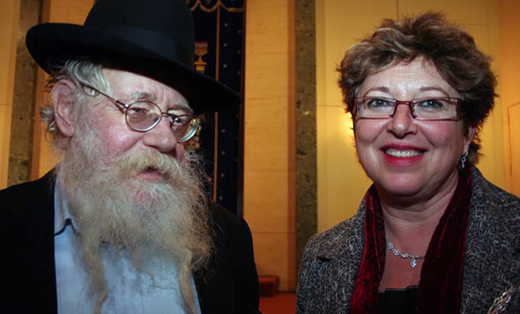
One of the speakers recalled the Rav saying, “If I know myself, it doesn’t matter what others think,” and that among his goals were that he wanted people to feel proud they are Jewish.
What’s next?
“As innovators,” said Rabbi Meni Even-Israel, Executive Director of the Steinsaltz Center, “our strength lies in our ability to figure out what’s next. This event [the dinner] … will provide us with an opportunity to honor my father, showcase his seminal works and revel in our past successes, as well as allow us to lay the groundwork for the future of Jewish learning… we hope to illuminate laptops, tablets and smartphones with new pedagogical possibilities…For a nominal fee, the Steinsaltz Center’s entire expansive library will be accessible from anywhere in the world, and it will be searchable, printable and shareable, allowing for profound and creative engagement with the texts. This platform is already in development, and the beta version will be launched by the end of 2019. These are exciting times for knowledge seekers everywhere.”
In 2014, Professor Susan Handelman (who was also close to the Rebbe) wrote about the Rav’s connection to the Lubavitcher Rebbe in a review of Rav Steinsaltz’s book My Rebbe:
“I could see that his [Rav Steinsaltz’s] life projects were a response to the urgent mandate of the Rebbe: to bring Torah to every Jew, no matter who, no matter where, to rebuild Jewish life after the devastations of the Holocaust in Europe; to reverse the Communist eradication of Judaism in Russia; and to combat widespread assimilation in the West.”
And bringing Torah to every Jew is the mission to which Rav Adin Even-Israel and the Steinsaltz Center continue to dedicate their existence.
*
The author is an award-winning educational theater director and the editor of WholeFamily.com